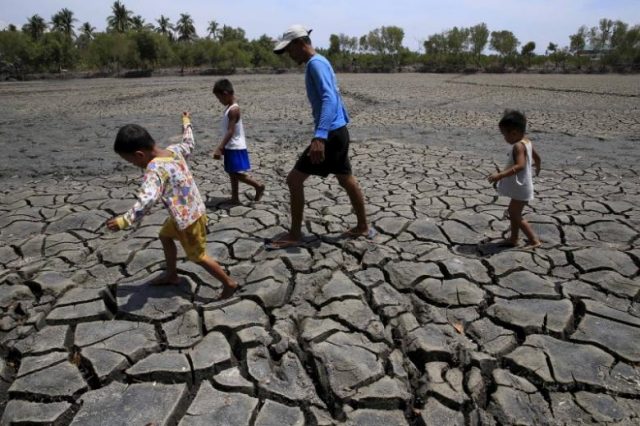The author belongs to the Order of Augustinian Recollects and is an artist and staunch advocate for the environment. In March last year, he received in Manila the first “Green Ring” award from former US vice president and Nobel laureate Al Gore, founder of the Climate Reality Project, with which he is also involved.
The Paris Agreement is beyond Paris, beyond the U.N. Headquarters in New York, and even beyond Trump’s delinquent persona. It rests in all areas affected by the climate crisis.
Trump’s Climate Denial. Trump’s announcement that he would withdraw the U.S. from the Paris Agreement is a total shame for his government and country. Where countries are trying to move towards a collective direction to survive the clear and present danger of climate change, Trump, solely for his own political and business agenda — and influenced by the Competitive Enterprise Institute — withdraws from the Paris Agreement.
“The Paris Accord is very unfair, at the highest level, to the United States,” he said.
One hundred ninety five countries signed the Paris Agreement, 148 have ratified it, including the United States on November 4, 2016.
But four days after, Trump, climate change denier, denier of global warming, was elected president. Among his major promises was the revitalization of the environmentally destructive coal industry, as he blasted the previous administration’s “expensive” Clean Power Plan.
The U.S. power pendulum from Barack Obama’s climate change commitment to Trump’s profit-driven climate denial has greatly affected the American people’s hard-earned commitment to care for the planet.
This is a continuing battle, one that is more risky for environmental activists fighting at the grassroots.
The Post-Paris Plan. During the days of COP21, eminent Canadian activist Naomi Klein said: “We need a post-Paris plan — a people’s plan!” The post-Paris plan is a strategy of grassroots struggle for a greener future, realizing that we cannot entirely entrust our future in corporate, institutional and, especially not imperialist-driven, pseudo commitments. The post-Paris plan depends on a desired commitment for climate justice.
It is a People’s Plan, not a decision of a few representatives comprising the Conference of Parties.
More than a thousand Americans were present at Paris during COP21 either as delegates, observers, or activists at the redlines actions.
For many, the Paris Agreement is better than no agreement at all. But among those working on the redlines of actions for the climate, the following key points could have emboldened the Paris Agreement:
- Consistent 1.5°C temperature goal. The 2.0°C is just a mask to shield “abusive” countries who might be signing the agreement but failed to commit.
- The 2050 definitive goal to make the world 100% fossil fuels free (net zero emission). This is a serious goal that guarantees concrete deliverables of fossil-free commitment. Such a goal will entirely dismantle the future business of oil cartels, fossil-fuel industry, coal and mining.
- Participatory formulation of “nationally determined contributions” (NDCs) of every country, not limited to government agencies; acknowledging the contributions of people’s organizations, NGOs and expert individuals.
- Supporting the most vulnerable countries, especially the island nations impacted by climate change.
- Creating a framework mechanism that clearly stipulate the accountability of rich nations as well as countries who signed the agreement.
- Rights protection of indigenous peoples who are directly affected by climate impacts; including issues on human rights and women’s rights.
Committed people’s organizations and activists are continuously calling for all these integrated actions well after the Paris Agreement.
Pope Francis’ moral call. Pope Francis offers an alternative moral commitment of a grounded concern for the planet. His Encyclical for the Environment, entitled Laudato Si’ (On Care for Our Common Home) is the first definitive document by a world leader affirming the reality of climate change and offering lines of actions on how communities and individuals can counter the many environmental changes.
Even at the start of his pontificate he calls for an end of environmental changes, “which are already being dramatically felt in many countries, especially the insular states of the Pacific, remind us of the gravity of neglect and inaction. The time to find global solutions is running out. We can find appropriate solutions only if we act together and in agreement. There is therefore a clear, definitive and urgent ethical imperative to act.” (Message of Pope Francis to the President of COP 20 under the United Nations Framework Convention on Climate Change)
Although Pope Francis attempted to convince Donald Trump by handing him a copy of the encyclical during the latter’s official visit to the Vatican, the US president remained a climate skeptic.
Voices. Trump’s withdrawal from the Paris Agreement elicited voices of discontent among world leaders, climate activists and even ordinary citizens. Yeb Saño, a climate hero and the executive director of Greenpeace Southeast Asia, said in a statement: “This is a day that will be written in history as the day the US, under the administration of President Trump, turned its back on those who needed its leadership, ambition and compassion … We in the Philippines are on the frontlines of climate change and will hold the polluters accountable for the suffering and injustice global warming is already inflicting upon our people. We are not alone though. Our global community will take action, and is already taking action, with or without the US government…”
Al Gore, former U.S. Vice President and Nobel Peace laureate, whose upcoming film “An Inconvenient Sequel: Truth to Power” is due for release on July 28 this year, issued a statement clearly emphasizing a people’s alternative, saying: “Removing the United States from the Paris Agreement is a reckless and indefensible action. It undermines America’s standing in the world and threatens to damage humanity’s ability to solve the climate crisis in time. But make no mistake: if President Trump won’t lead, the American people will.”
Bill McKibben, the founder of 350.org, in his NYTimes op-ed column said: “We will make sure that every leader who hesitates and waffles on climate will be seen as another Donald Trump, and we will make sure that history will judge that name with the contempt it deserves. Not just because he didn’t take climate change seriously, but also because he didn’t take civilization seriously.”
The collective disgust of the different countries was clearly expressed by President Emmanuel Macron of France: “Make our planet great again.”
System change, not climate change. The common battle cry during the COP21 protests was “system change, not climate change.” This means if we continue to elect leaders, political parties or passive institutions whose concern for the environment is their least priority, whose framework remains “profit over planet and people,” then we continue to worsen the impacts of climate change. This cry is a continuing call of protest even beyond the Paris Agreement.
Our struggle is beyond Paris. It is not just about signing the agreement but consistently fighting to defend the people and the planet. Locally, we organize to fight the corporate greed that pollutes our community, that destroys Mother Earth.
Trump’s rejection of the Paris Agreement is beyond the U.S. — it means the island nations must prepare for more devastating climate tragedies, it means communities are not protected, it means more people will have to suffer, it means more harm to our planet.
But whatever the future holds, on the ground, grassroots activists will remain committed to undertake more actions and demand climate justice.










